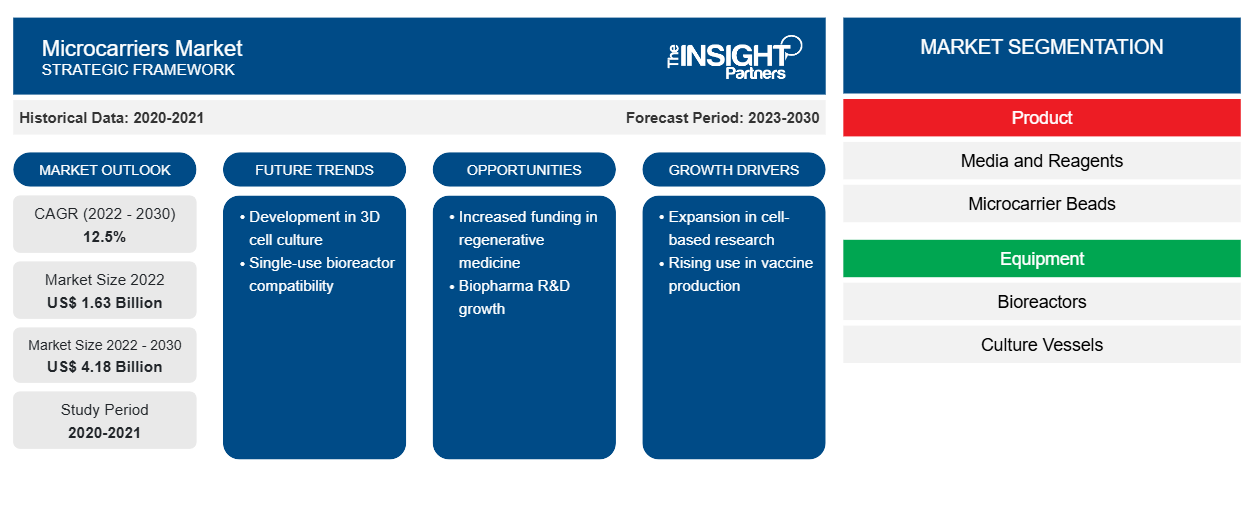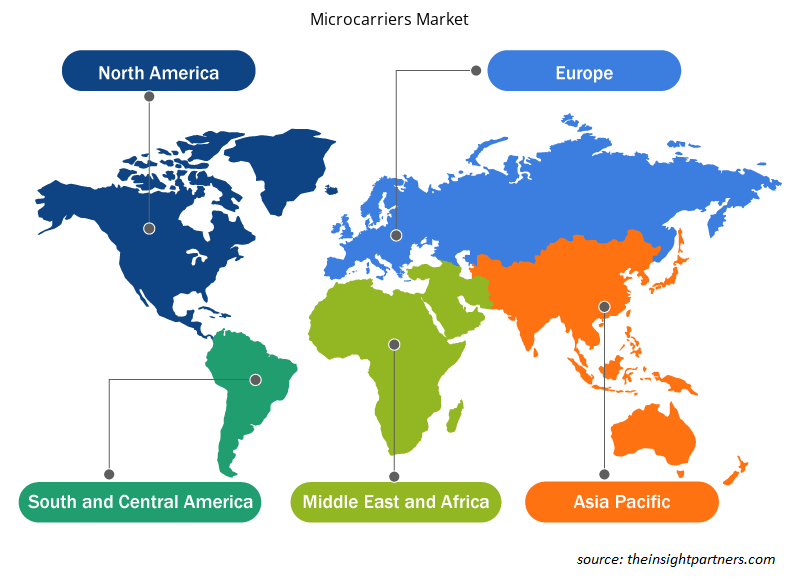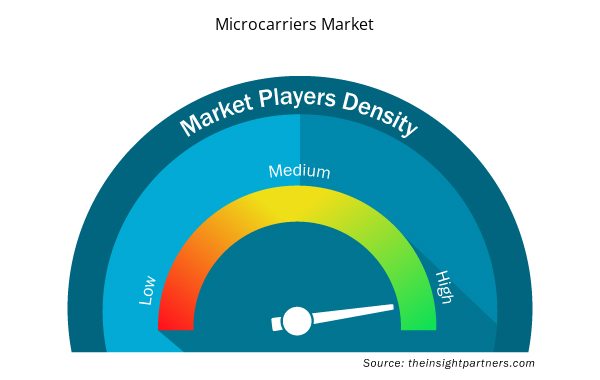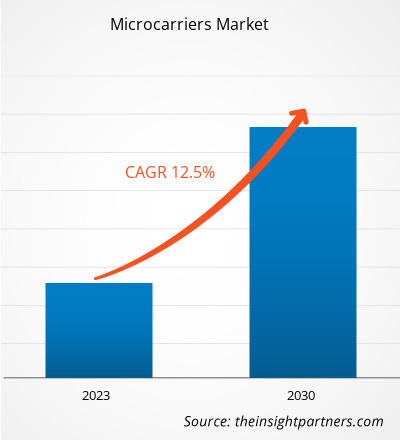[Research Report] The microcarriers market size is projected to grow from US$ 1,625.84 million in 2022 to US$ 4,178.86 million by 2030; the market is estimated to record a CAGR of 12.5% during 2022-2030.
Market Insights and Analyst View:
Microcarriers are used in a variety of applications, from cell culture to drug delivery. They are employed to stimulate the growth of cells in culture media by providing a larger surface area for cell attachment. They can be used in applications such as vaccine production, biopharmaceuticals, and stem cell research. The microcarrier market's growth is attributed to the growing demand for cell-based vaccines and therapeutics, the rising incidence of various diseases and disorders like diabetes, cancer, hemophilia, rheumatoid arthritis, and others, huge investments for the development of innovative therapies, and consistent technological advancements in cell biology research.
Companies operating in the microcarriers market are focusing on strategic developments such as collaborations, expansions, agreements, partnerships, and new product launches, which help them improve their sales, expand their geographic reach, and enhance their capacities to cater to a larger than existing customer base. For instance, in October 2023, Kuraray Co., Ltd. developed PVA hydrogel microcarriers for cell cultures used in regenerative medicine. The product is scheduled for launch in January 2024 in Japan and overseas, beginning in the US.
Growth Drivers:
Need for Cell Therapies with Rising Incidence of Cancer and Infectious Diseases
World Health Organization (WHO) states that the global burden of cancer is estimated to rise to 27.5 million new cases and 16.3 million mortalities by 2040. The American Cancer Society projected 1,918,030 new cancer cases and 609,360 related deaths in the US for the year 2022, including nearly 350 deaths/day from lung cancer, which is a major cause of cancer mortality. According to the Australian Institute of Health and Welfare, there were more than 324,000 hospitalizations for infectious diseases, and more than 4,700 hospitalizations due to COVID-19 infection in Australia in 2020–2021. Further, a total of 1.6 million people died from tuberculosis (TB) in 2021 (including 187,000 people with HIV). TB ranks 13th in the leading causes of mortality and 2nd among the major causes of deaths due to infectious diseases worldwide, after COVID-19 (above HIV and AIDS).
The increasing incidence of diseases where cell therapy can be effectively applied, such as cancers, urinary problems, autoimmune diseases, and infectious diseases, is associated with the growth of the microcarriers market. Microcarriers are small spheres or particles (typically 90–300 µm in diameter) used for culturing adherent cells in stirred-tank bioreactors. With the growing incidence of cancer and various infectious diseases, the need for proper medication and vaccines arises, which favors the microcarriers market growth.
Customize This Report To Suit Your Requirement
You will get customization on any report - free of charge - including parts of this report, or country-level analysis, Excel Data pack, as well as avail great offers and discounts for start-ups & universities
Microcarriers Market: Strategic Insights

- Get Top Key Market Trends of this report.This FREE sample will include data analysis, ranging from market trends to estimates and forecasts.
Customize This Report To Suit Your Requirement
You will get customization on any report - free of charge - including parts of this report, or country-level analysis, Excel Data pack, as well as avail great offers and discounts for start-ups & universities
Microcarriers Market: Strategic Insights

- Get Top Key Market Trends of this report.This FREE sample will include data analysis, ranging from market trends to estimates and forecasts.
Report Segmentation and Scope:
The “microcarriers market” is segmented on the basis of product, equipment, application, and end user. Based on product, the market is bifibracted into microcarrier beads and media & reagents. The microcarriers market, by equipment, is segmented into bioreactors, culture vessels, and others. Based on application, the market is segregated into biopharmaceutical production, cell and gene therapy, tissue engineering and regenerative medicine, and others. The biopharmaceutical production segment is subsegmented into therapeutic protein and vaccine production. Based on end user, the market is segmented into pharmaceutical and biotechnology companies, contract research organizations and contract manufacturing organizations, and academic and research institutes.
Segmental Analysis:
Based on product, the microcarriers market is divided into microcarrier beads, and media and reagents. In 2022, the microcarrier beads segment held the largest market share, and same is estimated to register the fastest CAGR of 12.8% during 2022–2030. Growing cell biology research, demand for regenerative medicines and biopharmaceuticals, and the presence of multiple manufacturers and suppliers contribute to the considerable market growth of microcarrier beads. Extensive product offerings and continuous developments in microcarrier technology offer lucrative opportunities for the growth of key market players. Major companies such as Sartorius AG offer microcarrier beads that are free of animal components and proteins coated.
Based on equipment, the microcarriers market is segmented into bioreactors, culture vessels, and others. In 2022, the bioreactors segment held the largest market share, and same is estimated to register the fastest CAGR of 12.8% during 2022–2030. Bioreactors are manufacturing devices or vessels in which biological reactions are carried out; they are used to grow microorganisms such as yeast, bacteria, or animal cells in an appropriate environment under controlled conditions. A microcarrier-based bioreactor allows the real-time off-line monitoring of cell growth, and quality and metabolite analyses, which can be utilized to detect errors and rectify them immediately.
Based on application, the microcarriers market is segmented into biopharmaceutical production, cell and gene therapy, tissue engineering and regenerative medicine, and others. In 2022, the biopharmaceutical production segment held the largest market share, and the same is estimated to register the fastest CAGR of 13.1% during 2022–2030. The biopharmaceutical production segment is further subsegmented into therapeutic production and vaccine production. Microcarriers are an established technology in the biopharmaceutical industry, which, in combination with stirred-tank bioreactors, can provide the necessary environment for large-scale production of adherent cells. Biodegradable materials used in the production of microcarriers can solve in vitro disease modeling.
Based on end user, the microcarriers market is segmented into pharmaceutical and biotechnology companies, contract research organizations and contract manufacturing organizations, and academic and research institutes. The pharmaceutical and biotechnology companies segment held the largest market share in 2022. The same segment is estimated to register the highest CAGR of 12.9% in the market during the forecast period. Pharmaceutical companies hold a major share of the total medicine production. Pharmaceutical manufacturing processes are often based on biotechnology principles that involve the use of bacteria to produce insulin, human growth hormone, and other products. Pharmaceutical and biotechnological industries have witnessed extensive growth in the past decade, mainly due to increased R&D activities and regulatory approvals for the introduction of new microbial products. Such a massive scale of innovation is projected to drive the adoption of bioreactors in pharmaceutical and biotechnological manufacturing in the coming years, eventually favoring the microcarriers market growth.
Regional Analysis:
Based on geography, the global microcarriers market is segmented into North America, Europe, Asia Pacific, South & Central America, and Middle East & Africa. In 2022, North America contributed the largest share of the global microcarriers market size. Asia Pacific is expected to register the highest CAGR during 2022–2030.
The microcarriers market in North America is split into the US, Canada, and Mexico. The growth of the market in the region is attributed to factors such as the increasing number of product launches by biotechnology and biopharmaceutical companies, the presence of key market players, and extensive R&D by various academic and research institutes. The US is the largest contributor to the microcarriers market in North America and the world. Market growth in the US is mainly attributed to the rising prevalence of chronic diseases. As per the Centers for Disease Control and Prevention (CDC), 6 in 10 Americans live with at least 1 chronic disease, such as diabetes or heart disease and stroke, cancer. These diseases are the significant causes of mortality and disability in the US, and they also lead to significant costs of healthcare. There have been extensive clinical developments in the field of cell and gene therapies (CGT), owing to which the application range of these therapies has expanded in the past 5 years. With the approval of 12 new therapies and the commencement of over 2,900 clinical trials during 2016–2021, there have been extensive investments in CGT innovations. Technological advancements in gene editing, followed by clinical trials to evaluate the therapeutic effectiveness of the technique, are the other factors that have benefitted the microcarriers market in the US. Poseida Therapeutics, Inc. received the US Food and Drug Administration (FDA) approval for its Investigational New Drug (IND) application for P-CD19CD20-ALLO1—the company's first allogeneic dual CAR-T cell product candidate targeting both CD19 and CD20 antigens for the treatment of relapsed or refractory B-cell malignancies—being developed in partnership with Roche. In April 2023, Novel allogeneic CAR T-cell therapy delivered results in patients with metastatic clear cell renal cell carcinoma.
Increased participation and investments in clinical trials can accelerate the adoption and availability of new therapies. Researchers at the University of Texas MD Anderson Cancer Center led the Phase I trial and presented at the American Association for Cancer Research (AACR) Annual Meeting 2023 to represented the researchers’ continuing efforts to advance clinical studies and expand possible suggestions of approved drugs to develop a podium for more effective treatments and to improve patient outcomes. In August 2023, Astellas Pharma Inc. and Poseida Therapeutics, Inc. announced a strategic investment to support the advancement of Poseida's commitment to redefining cancer cell therapy. Astellas invested US$ 50 million to license one of Poseida's clinical-stage programs on P-MUC1C-ALLO1, an allogeneic CAR T-cell therapy for multiple solid tumor indications. Thus, the demand for microcarriers is on the rise in the US with the increasing number of chronic disease cases, and approval of different cell and gene therapies.
Microcarriers Market Regional Insights
Microcarriers Market Regional Insights
The regional trends and factors influencing the Microcarriers Market throughout the forecast period have been thoroughly explained by the analysts at Insight Partners. This section also discusses Microcarriers Market segments and geography across North America, Europe, Asia Pacific, Middle East and Africa, and South and Central America.

- Get the Regional Specific Data for Microcarriers Market
Microcarriers Market Report Scope
| Report Attribute | Details |
|---|---|
| Market size in 2022 | US$ 1.63 Billion |
| Market Size by 2030 | US$ 4.18 Billion |
| Global CAGR (2022 - 2030) | 12.5% |
| Historical Data | 2020-2021 |
| Forecast period | 2023-2030 |
| Segments Covered |
By Product
|
| Regions and Countries Covered | North America
|
| Market leaders and key company profiles |
Microcarriers Market Players Density: Understanding Its Impact on Business Dynamics
The Microcarriers Market market is growing rapidly, driven by increasing end-user demand due to factors such as evolving consumer preferences, technological advancements, and greater awareness of the product's benefits. As demand rises, businesses are expanding their offerings, innovating to meet consumer needs, and capitalizing on emerging trends, which further fuels market growth.
Market players density refers to the distribution of firms or companies operating within a particular market or industry. It indicates how many competitors (market players) are present in a given market space relative to its size or total market value.
Major Companies operating in the Microcarriers Market are:
- Teijin Ltd
- Bio-Rad Laboratories Inc
- denovoMATRIX GmbH
- Sartorius AG
- Danaher Corp
Disclaimer: The companies listed above are not ranked in any particular order.

- Get the Microcarriers Market top key players overview
Industry Developments and Future Opportunities:
Various initiatives taken by leading players operating in the microcarriers market are listed below:
- In June 2023, Teijin Ltd introduced new nonwoven microcarriers for the rapidly growing large-scale cell culture. This scaffolding substance promotes three-dimensional adhesion, facilitating the growth of a variety of cell types.
- In May 2022, Saint-Gobain Life Sciences released beadMATRIX for mesenchymal stromal cells (MSCs). beadMATRIX are ready-to-use, pre-coated microcarriers free of animal components that are used to cultivate superior MSCs in vitro. Shaker bags, stirred tanks, vertical wheel bioreactors, and shaker flasks are the perfect environments for beadMATRIX.
- In June 2023, NOVA, a Saint-Gobain Life Sciences’ investment arm, announced an investment into denovoMATRIX. As an extension of the master service agreement that focuses on products related to the stem cell therapy market, both parties aimed to consolidate their relationship, thereby leveraging the global reach of Saint-Gobain Life Sciences and the innovative product line of the denovoMATRIX team.
Competitive Landscape and Key Companies:
Teijin Ltd, Bio-Rad Laboratories Inc, denovoMATRIX GmbH, Sartorius AG, Danaher Corp, Corning Inc, Eppendorf SE, Percell Biolytica AB, Asahi Kasei Corp, and Polysciences Inc are the prominent microcarriers market companies. These companies focus on new technologies, upgrading of existing products, and geographic expansions to meet the growing consumer demand worldwide.
- Historical Analysis (2 Years), Base Year, Forecast (7 Years) with CAGR
- PEST and SWOT Analysis
- Market Size Value / Volume - Global, Regional, Country
- Industry and Competitive Landscape
- Excel Dataset


- Fish Protein Hydrolysate Market
- Electronic Signature Software Market
- Artificial Turf Market
- Dry Eye Products Market
- Thermal Energy Storage Market
- Aquaculture Market
- Space Situational Awareness (SSA) Market
- Pipe Relining Market
- Energy Recovery Ventilator Market
- Integrated Platform Management System Market

Report Coverage
Revenue forecast, Company Analysis, Industry landscape, Growth factors, and Trends

Segment Covered
Product, Equipment, Application, End User, and Geography

Regional Scope
North America, Europe, Asia Pacific, Middle East & Africa, South & Central America

Country Scope
This text is related
to country scope.
Frequently Asked Questions
The Microcarriers Market majorly consists of the players such as Teijin Ltd, Bio-Rad Laboratories Inc, denovoMATRIX GmbH, Sartorius AG, Danaher Corp, Corning Inc, Eppendorf SE, Percell Biolytica AB, Asahi Kasei Corp, Polysciences Inc.
Microcarriers provide an efficient way to analyze biological data collected from different cell types. This data can be used to discover new drugs and therapies. The rising demand for automated and miniaturized products is anticipated to drive the growth of the microcarriers market. Additionally, the increasing demand for specialized products and services is also expected to contribute to the growth of the microcarrier industry.
The growth of the market is attributed to the need for cell therapies with rising incidence of cancer and infectious diseases, and increasing popularity of outsourcing cell and gene therapy manufacturing boost the market growth. However, the high cost of biologics and cell-based therapies hampers the market growth.
The Microcarriers Market is analyzed on product, equipment, application, and end users. Based on product, the market is segmented into microcarrier beads and media & reagents. Based on equipment, the market is segmented into bioreactors, culture vessels, and others. Based on application, the market is segmented into biopharmaceutical production, cell and gene therapy, tissue engineering and regenerative medicine, and others. The biopharmaceutical production segment is subsegmented into therapeutic protein and vaccine production. Based on end user, the market is segmented into pharmaceutical and biotechnology companies, contract research organizations and contract manufacturing organizations, and academic and research institutes.
Trends and growth analysis reports related to Life Sciences : READ MORE..
The List of Companies - Microcarriers Market
- Teijin Ltd
- Bio-Rad Laboratories Inc
- denovoMATRIX GmbH
- Sartorius AG
- Danaher Corp
- Corning Inc
- Eppendorf SE
- Percell Biolytica AB
- Asahi Kasei Corp
- Polysciences Inc

 Get Free Sample For
Get Free Sample For